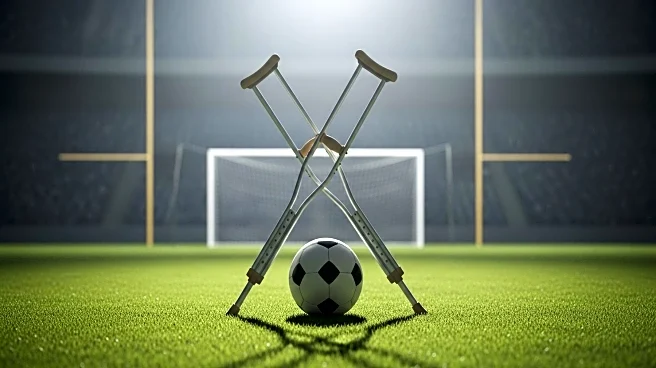What's Happening?
Brentford defender Aaron Hickey has become an injury concern for Scotland's upcoming World Cup qualifier against Belarus. Hickey was substituted in the 58th minute during Scotland's 3-1 victory over Greece due to a knee injury. Scotland's manager, Steve Clarke, described the injury as a 'small tweak' to Hickey's knee, which had already been a concern prior to the match. Clarke had called Max Johnston into the squad as cover, anticipating potential issues with Hickey's fitness. Hickey's injury is particularly concerning given his recent return to full fitness after a prolonged two-year battle with a recurring hamstring injury.
Why It's Important?
The injury to Aaron Hickey is significant for both Scotland and Brentford. For Scotland, Hickey's absence could impact their defensive strategy in the crucial World Cup qualifier against Belarus. His recent form has been vital for the national team, and his potential absence could necessitate tactical adjustments. For Brentford, Hickey's injury raises concerns about his availability for upcoming club fixtures. Having recently regained full fitness, any setback could affect Brentford's defensive lineup and overall performance in the league. The situation underscores the challenges teams face with player injuries during international duties.
What's Next?
Scotland will need to assess Hickey's condition closely before the match against Belarus. Manager Steve Clarke may have to rely on Max Johnston or other squad members to fill the defensive gap if Hickey is unable to play. Brentford will also be monitoring Hickey's recovery, as his fitness is crucial for their upcoming matches. Both teams will likely prioritize Hickey's health to ensure his long-term availability, potentially adjusting training and recovery protocols to prevent further injuries.
Beyond the Headlines
Hickey's injury highlights the broader issue of player fitness and the impact of international duties on club commitments. It raises questions about the balance between national team responsibilities and club priorities, especially when players are recovering from previous injuries. The situation may prompt discussions on how clubs and national teams can better collaborate to manage player health and minimize injury risks during international breaks.








